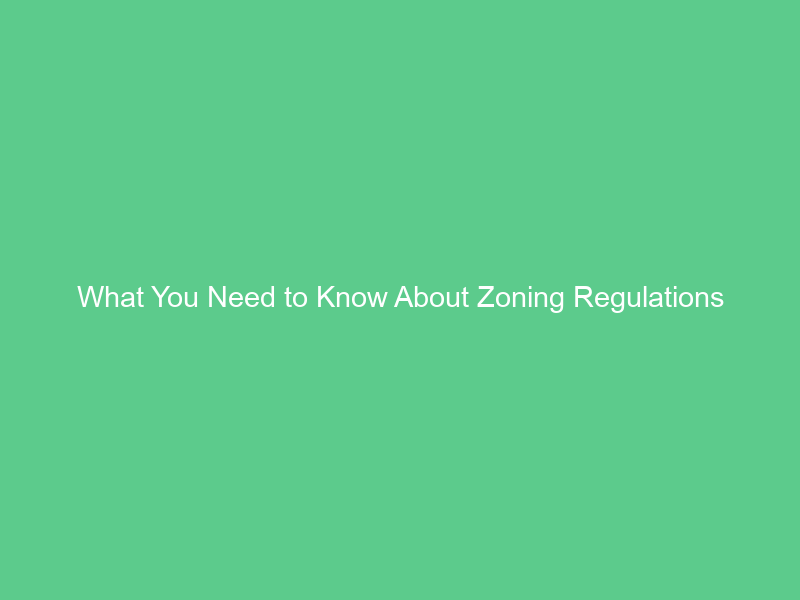If you are planning an addition or raising chickens in the backyard, it is essential that you become familiar with local zoning laws. While they can seem intimidatingly complex at first, these regulations actually govern everything from property values and project viability.
Zoning regulations strictly outline which businesses may locate within each zone based on definitions that have existed for generations.
Residential
Zoning laws regulate the construction of certain types of buildings within an area. For instance, in residential zones they might only permit single-family houses on specific lots; this helps preserve neighborhood integrity and safeguard property values.
Residential zoning laws may also govern what kind of animals can reside at a residence. Domestic pets typically don’t fall into this category; however farm animals such as chickens, sheep, goats and cattle could potentially be restricted or prohibited altogether. Some laws also regulate home-based businesses within residential neighborhoods by setting specific hours or mandating separate entrances/parking spaces for commercial tenants.
Modern criticisms of zoning laws claim they encourage residents to become car dependent and contribute to an inhospitable environment, therefore making property purchases less sustainable. Therefore, homeowners and potential buyers need to understand which zoning laws affect an area before purchasing property to help determine whether it meets their specific needs and requirements.
Commercial
Zoning regulations are an integral component of commercial real estate purchases or developments, yet can often be complex and vary based on which municipality one resides in.
Understanding commercial zoning laws is crucial for business owners, developers and investors to avoid making costly errors. These regulations govern which kinds of businesses can be established in certain locations as well as other details like structure sizes and placement, signage regulations and parking requirements – among many other regulations.
Commercial zoning encompasses various categories, such as retail, office and industrial. Retail zoning typically denotes areas where stores and shopping centers may be built while also governing aspects such as sign placement and overall appearance of these spaces.
Industrial zoning may include stricter noise and heavy vehicle access requirements to prevent disturbances to residential communities. Furthermore, it regulates warehouses and manufacturing facilities within its boundaries as well as streamlining approval processes to make purchasing or building commercial properties simpler for some cities.
Industrial
Industrial zoning governs the location, size and operation of industrial plants. Additionally, it applies to storage facilities and certain businesses like airports. Industrial zoning often depends on environmental concerns like noise levels; furthermore it can limit floor area ratio ratios as well as building height and setback requirements.
An industrial zoning law may permit manufacturing but also set forth specific limitations on how much smoke, fumes, carbon monoxide gas, dust, glare or odors may be dispersed into the atmosphere from any given business activity. Some laws even limit how often particular industrial activities release these emissions into the atmosphere per hour.
Zoning regulations vary by type and can regulate parking requirements, signage and landscaping requirements as well as energy efficiency standards and noise regulations, animal housing (chickens, goats, sheep, cattle or pigs kept on property) as well as animal husbandry (chickens, goats sheep cattle pigs or more) that is kept on property. Industrial zoning ordinances aim to protect residents from nuisance caused by these activities – though this can prove difficult when businesses located within residential neighborhoods produce offensive smells or create noise pollution.
Agricultural
Agricultural zoning laws designate specific areas for agricultural activities like planting, raising livestock and dairy farming. Typically these districts limit non-farm use and prohibit residential subdivisions or commercial developments from taking place there; minimum lot sizes as well as requirements such as front, side and rear yard sets may also be set out by them; impervious coverage rates; maximum building height are sometimes also included within these regulations – in certain communities this regulation even addresses housing for farm workers!
Most traditional agriculture-related activities are legal by default, with the exception of CAFOS and mushroom operations that pose greater potential adverse impacts to surrounding residential uses (e.g. odors or pests). More intensive agricultural activities may require special exception or conditional use provisions for approval, so legal professionals are essential when helping farmers and landowners navigate local zoning ordinances to achieve compliance with all relevant rules and regulations in order to maximize agricultural real estate’s value.

